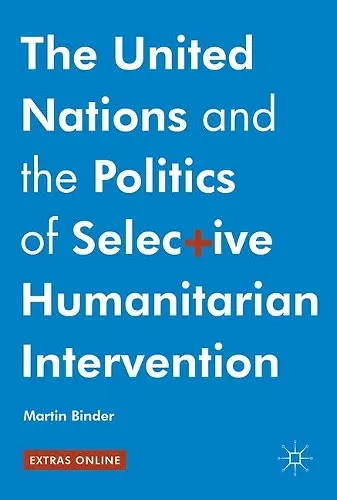The United Nations and the Politics of Selective Humanitarian Intervention
Format:Hardback
Publisher:Springer International Publishing AG
Published:4th Jan '17
Should be back in stock very soon
This hardback is available in another edition too:
- Paperback£99.99(9783319825571)

"The United Nations can play a role in global politics in so far as it is perceived as legitimate, and few decisions affect its legitimacy more than when and how to intervene in violent crises. Martin Binder asks a crucial question: why does the Security Council coercively intervene in certain humanitarian crises but not in others? Thanks to a wide-ranging and rigorous analysis, this brilliant book gives us an answer that is as simple as possible, but not simpler." (Dr Mathias Koenig-Archibugi, Associate Professor of Global Politics, London School of Economics, UK) "In a fascinating book, Binder moves us beyond the "isms" to explain how the humanitarian concerns, institutional factors, and power politics work together to explain the UN Security Council's decisions to intervene in humanitarian crises. Thus, he shows that focusing only one factor is an incomplete and biased view of Security Council decisions. He systematically explores and explains the vast majority of the 30+ Council decisions to intervene. Highly recommended." (Gary Goertz , Professor of Political Science and Peace Studies, University of Notre Dame, USA) "One of the most pervasive features of humanitarian interventions is its selectiveness. This brilliant analysis demonstrates that the differences in the choice of means can be explained by the interplay of humanitarian concerns, material interests, and institutional effects. It is a book that is enormously rich in both dimensions: substance and methodological sophistication. This is rare." (Michael Zuern, Director at the WZB Berlin Social Science Center, Germany)
By combining fuzzy-set analysis of the UN’s response to more than 30 humanitarian crises with in depth-case study analysis of UN (in)action in Bosnia and Darfur, as well as in the most recent crises in Côte d’Ivoire, Libya and Syria, this volume seeks to answer these questions.
This book offers the first book-length explanation of the UN’s politics of selective humanitarian intervention. Over the past 20 years the United Nations has imposed economic sanctions, deployed peacekeeping operations, and even conducted or authorized military intervention in Somalia, Bosnia, or Libya. Yet no such measures were taken in other similar cases such as Colombia, Myanmar, Darfur—or more recently—Syria. What factors account for the UN’s selective response to humanitarian crises and what are the mechanism that drive—or block—UN intervention decisions? By combining fuzzy-set analysis of the UN’s response to more than 30 humanitarian crises with in depth-case study analysis of UN (in)action in Bosnia and Darfur, as well as in the most recent crises in Côte d’Ivoire, Libya and Syria, this volume seeks to answer these questions.
ISBN: 9783319423531
Dimensions: unknown
Weight: unknown
297 pages
1st ed. 2017